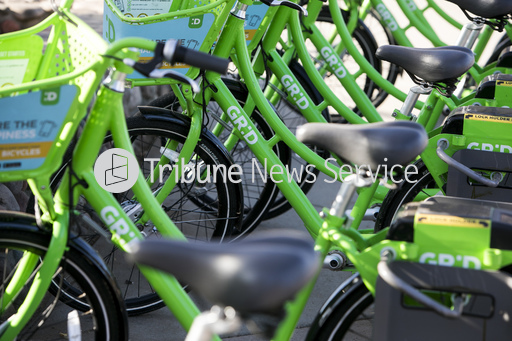
San Diego is the latest hub for dockless bike-sharing, infesting the streets with electric bikes and scooters.
Eco-friendly companies such as Ofo, Bird, Limebike, and Mobike are just a few of the names popping up along SD streets. This is the first instance of bike sharing San Diego has ever seen. These dockless bikes and scooters allow the rider to park their bike wherever is convenient for them, easing the carbon emissions by allowing drivers to ditch their cars and relieving the customer from the responsibility of chaining up. Each bike and scooter has its own GPS tracking mechanism, ensuring all bikes’ direct locations are shared with the company at all times. The easy-to-use apps show a map of your area with all nearby bikes or scooters marked for you. You simply select which one you’d like to use and the app guides you there with direction. In the vein of easy access, these apps allow for cheap travel between short distances across the city.
However with the accessibility of dockless vehicles granted to the riders, city officials are finding the freedom a burden. Some communities such as Little Italy and Coronado view the bikes as litter on their streets. Coronado has even declared them a public nuisance, and are specifically targeting and impounding the bikes. The company Bird has proposed the pledge to “Save Our Sidewalks”, also known as S.O.S., in an attempt to tidy up the streets and lessen the clutter of bikes and scooters. The plan entails each bike and scooter to be repositioned every night, and a donation of one dollar per vehicle to the participating cities. Bird has asked the other companies to join them with the agreement, but competitors are leery. When asked, Taylor Bennett, a spokesperson of Ofo has stated that she believes Bird’s intention to be in the wrong place. She went on to say that Bird “has made a clear trend of operating first without prior approval, just like it’s approach to entering cities,” and that they have again “resorted to bullying tactics to push its own agenda and forgo any sort of community collaboration.”
With each activation standing at one dollar, in addition to 15 cents per minute of ride time, Bird’s proposal of one dollar per vehicle a night seems like a fair one. Both giving back to the city and allowing them to be repositioned as to not seem like such a burden. However, unlike its competitors Bird did not seek approval from the city before setting up, and did not notify any of the communities forced to participate. For this reason, Ofo believes that Bird is enacting this plan for their own better interest to appear more community oriented in the eyes of the public. Until we are given more exact information on what Ofo and the other companies mean by “collaborating with the community,” we are left to applaud the only one taking action to make a difference.
So ride them or hate them, because you may only have them for a little while.

